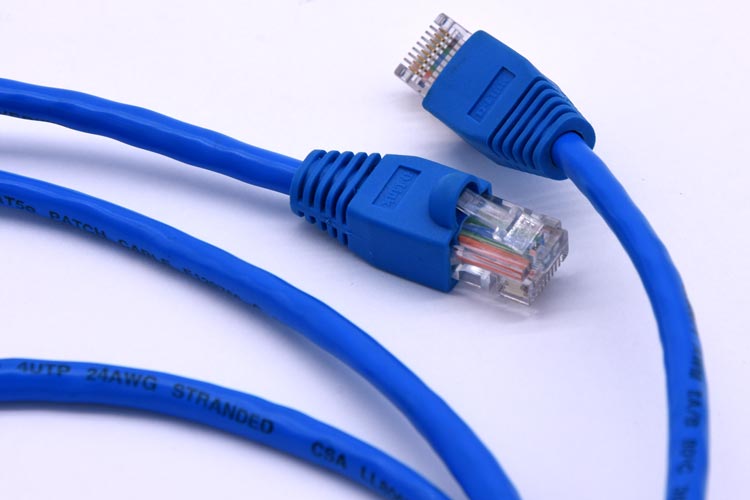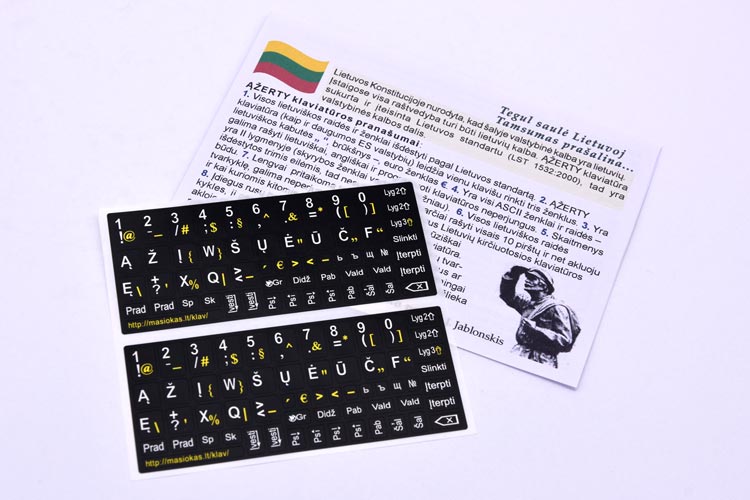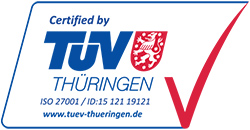Check .lt domain
Moving online: The registration of .lt domains has increased due to the coronavirus
The spreading coronavirus makes more and more businesses move online – more e-shops are established while remote work and learning become particularly relevant under the quarantine. The Internet Service Centre DOMREG at Kaunas University of Technology (KTU) notices the growth in the registration of .lt domain names – their number has crossed the threshold of 200 000 domains. Quite a few new names are directly related to the coronavirus pandemic.
The head of the Customer Service Office of KTU Internet Service Centre DOMREG Tomas Mackus assures that as soon as the world started talking about the coronavirus, the registration of the related .lt domains has increased.
“The reality of life is reflected in the online environment. Now, there is an abundance of the created domain names containing keywords “virus”, “corona”, “convid-19”, “masks”, “disinfection”, “disinfectants”, etc. Also, many .lt domain names are created for e-shops. It indicates that businesses and users are more active in moving online: online shopping is more intense; the remote work and learning tools are used more often. I have no doubt that the internet will be used more actively for these purposes even after the quarantine”, – states T. Mackus.
The Lithuanian internet has grown twice in a decade
A significant threshold of 200 000 registered .lt domains was reached in January 2020. Lithuania crossed the limit of 100 000 registered .lt domains in 2009. In a decade, the Lithuanian internet has grown twice according to the number of the registered national domains; while .lt domain remains the most popular one in Lithuania.
“Even though the number 200 000 is very beautiful, the consistency of growth is more important. The total growth of the number of .lt domains in the last years is not big but it can be considered average in comparison to the growth of the number of domains in Europe. I think .lt domain will be useful because the activities continue to move online and we notice this process becoming faster due to the circumstances”, – says the head of KTU Internet Service Centre DOMREG Daiva Tamulionienė.
To make the websites, e-shops and other online services constantly accessible, it is very important to ensure the functioning of the Domain Name System (DNS). According to the respondent, the consistent growth of the use of the internet caused significant investments into the infrastructure of .lt domain which was constantly expanded and modernised.

New stage of internet development
The head of the association INFOBALT uniting the Information Technology and Communication (ITC) companies Mindaugas Ubartas assures that the next important stage of the development of the Lithuanian internet should be the installation of the fifth generation (5G) mobile network. 5G will expand the services in real time and prevent telephone and internet network malfunctions when their use increases drastically at the same time, for example, due to the quarantine. The new blocks of private homes built in the municipalities surrounding the large cities of Lithuania still lack high-speed internet because of the absence of the fibre internet. Moreover, 5G technology will lead to substantial changes in the Internet of Things.
“I think that right now there is no such thing as the Internet of Things and it can appear with 5G. Right now we only have the collection of information from sensors. 5G will allow having tens or hundreds of thousands of sensors in a square kilometre; if we collect such amount of information and use the algorithms that can make certain decisions independently, we would have the new level of services. Right now we only have remotely controlled home, water and heating networks and we aim to have the autonomous systems able to make decisions without human involvement. The algorithms would control traffic and other areas of our life”, – explains M. Ubartas.
The head of INFOBALT is convinced that Lithuania has every chance to be one of the global ITC leaders with well-developed infrastructure; however, so far there is insufficient willingness to develop e-services more intensely and use more information technologies in all the areas of life.
“I believe we will have a better future in Lithuania with 5G. I think Lithuania has to become the most efficient country in the world. I believe we will achieve that when we have Real-Time Service (RTS), Real-time Governance (RTG) and all Real-Time Economy (RTE). It is only the question of time when we reach this goal: the first or the last; of course, the first ones will get the most of it.
I do not understand why we are talking about the slow operating of the websites, why I have to wait five days when I submit an electronic inquiry? We have to stop making people do ineffective work because no computer is more powerful than the human brain. People have to work in areas that require creativity. We will witness this transformation in the next decade. We are not ready for that now. So far, I can see no hunger to become the first, no hunger to be innovative. Right now we have 5G in two areas of Vilnius but there are not talks about the testing and we are not ready to use it”, – M. Ubartas shares his doubts.

Internet is harmful to our literacy?
The development of global digital technologies poses quite a few challenges. Among them is the preservation of national identity, the creation of special vocabulary and the use of the correct Lithuanian language. The Chairman of the State Commission of the Lithuanian Language (VLKK) Audrys Antanaitis states that the predominant lisping, when domain names, text messages and emails are written without the use of the specific letters of the Lithuanian language, is harmful to the literacy of the Lithuanians.
“It is destroying our literacy. We have noticed and the surveys indicate that the language of the younger generation is extremely poor, and illiteracy has reached the level of the 19th century. Of course, we cannot say that it is characteristic to all the society, there are very literate people just as there are very illiterate ones. The internet and computers have contributed to this fact but we should not blame the IT sector. We cannot stop the progress but we have to learn to adapt to the new technologies and use them”, – emphasises the VLKK Chairman A. Antanaitis.
Even though KTU Internet Service Centre DOMREG allows to create .lt domain names using specific Lithuanian letters (Internationalized Domain Names (IDN)) from 2004, such domains are not very popular – they only make approximately 1% of all the registered .lt domains. According to T. Mackus, the use of English or incorrect Lithuanian words in the domain names is a natural consequence of globalisation.
“The Lithuanian market is not large; therefore, any business tries to be bigger or expects growth and initially invests in the trademarks that could be used not only in Lithuania.
The ones who are sure they will provide their services in Lithuania, i.e., small businesses and artisans, use quite a rich Lithuanian language as a competitive advantage – the domains with specific Lithuanian letters become the easily remembered Lithuanian trademarks”, – notices T. Mackus.
The researcher of the Institute of Data Science and Digital Technologies at Vilnius University, the head of the Localisation Section at the Lithuanian Computer Society Gintautas Grigas thinks that a habit of writing incorrectly without the specific Lithuanian letters ą, č, ę, ė, į, š, ų, ū, ž remains due to the English keyboard that is inconvenient to the Lithuanians.
“In Lithuania, the computers have so-called “numeric” keyboards. These are American keyboards with specific Lithuanian letters in the top row instead of the numbers and other symbols ( for example, !, @, #, * ). When a person needs to use these symbols, they have to switch to the English keyboard or find other ways to type these symbols. It is very inconvenient; therefore, eventually, people begin lisping and stop using the diacritical marks; it influences the declining rates of literacy when spelling and proofreading mistakes are tolerated more and more”, – states G. Grigas.

Lithuanian language is not an obstacle for the domain names
A difficult spelling of the Lithuanian language did not prevent the provider of programming services “NFQ Technologies” from creating the domain grįžtame.lt , the platform intended for the support of the Lithuanians stuck aboard due to the coronavirus pandemic.
“With rapid response to the problems of the Lithuanians abroad, we have created this platform so that the people of Lithuania who are unable to return home at the moment and do not know what to do could connect, join into groups and organise their trips home. We invite the Lithuanians who are stuck abroad to register and use Grįžtame.LT as the platform for mutual assistance, support and organisation of their return home”, – says the head of “NFQ Technologies” Paulius Insoda.
The Communications Regulatory Authority (RRT) broke the strict bureaucratic standards of the public authorities by creating an information website nebūkberyšio.lt that is particularly user-friendly and easy to use. On this website, people can measure the speed of their internet connection, assess the speed of Wi-Fi in Lithuania, get advice on the safe use of the internet and find other information resources suggested to the internet users by RRT.
“Like every public authority, we have to have an official website rrt.lt which provides a lot of administrative information and is important in terms of the publicity of the authority’s activities. Our goals are the competition in the sectors of electronic and other types of communication, the favourable environment for investments and the proper protection of user rights. We do a lot to achieve these goals by providing various measurement and internet tools that can be used to assess and compare the internet speed and coverage of various providers, assess the accessibility of services, get advice and recommendations. These are very valuable information resources coordinated by various departments of the authority that are a bit difficult to find on our official website that provides an abundance of information. To solve this problem, we have decided to find a more creative way to provide the useful tools to our users in a more attractive manner”, RRT Deputy Director Ieva Žilionienė tells how the idea of nebūkberyšio.lt was born.
The respondent assures that the domain name nebūkberyšio.lt is not accidental and .lt domain containing the specific Lithuanian letters makes it more distinctive, helps to avoid ambiguities and provides more convenient access to the users who write the “real” website address in their internet browser.
“We had an idea for a website and were searching for a user-friendly name. We chose nebūkberyšio.lt out of several options because it seemed the most appropriate from all points of view. While creating nebūkberyšio.lt and our other website švarusinternetas.lt , we registered both domain names – the incorrectly spelled and the one with specific Lithuanian letters.
Our language is beautiful and rich, it has many specific letters; therefore, it is often impossible to avoid them in names. Why register a domain name that is incorrect? Our websites švarusinternetas.lt and svarusinternetas.lt are a good example of how the meaning of the name changes if you change one letter (švarus – clean, svarus – solid). A possibility to use the specific Lithuanian letters in domain names is very important”, – emphasises I. Žilionienė.
The most beautiful Lithuanian domain names
To promote the use of the correct Lithuanian language online, change the users’ habits of the incorrect writing, draw attention to the technical possibilities of the use of the native language in the domains, the Lithuanian Computer Society organises an annual competition of the most beautiful Lithuanian domain name.
Last year, most of the web surfers gave their votes to the website of the community of the small town užventis.lt and RRT website nebūkberyšio.lt . This year, the title of the most beautiful domain name was awarded to the website of Biržai, Pasvalys and Rokiškis rural communities sukįkaimą.lt and the website of the Samogitian Language Institute žemaitėjė.lt .
Published 2020-04-03



